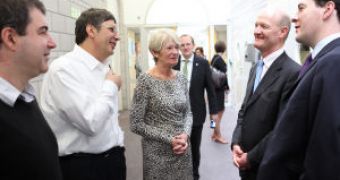Graphene is one of the materials expected to revolutionize technology as a whole, and the Chancellor of the Exchequer figured he may as well make a hefty investment into the research efforts.
No matter how good an idea, it just never gets to the point where it can help society advance if there is no money backing it up.
Graphene, fortunately, is one of the initiatives that will most likely be spared this unfortunate fate.
For those that don't know, this material is a two-dimensional substance, a monolayer of carbon atoms arranged in a hexagonal lattice.
All in all, it is one of the most versatile materials known to man and can be used in superfast Internet connections, transistors, touchscreens, mobile phones and even building lighter aircraft wings.
Graphene has some unique properties as well, such as unusual response to light (read about the topic here).
This week, the University of Manchester, where most of the research is carried out, received an investment of £50 Million ($77.69 / 57.82 Euro) from Chancellor of the Exchequer George Osborne.
Considering that the two scientists most involved in the project (Andre Geim and Kostya Novoselov) won the Nobel Prize for Physics, recognition was more or less warranted.
“Their prize was for the discovery of a substance called graphene. It’s the strongest, thinnest, best conducting material known to science, to be used in everything from aircraft wings to microchips,” said Osborne.
“The inventors could have gone anywhere in the world to do their research. But they chose The University of Manchester. We will fund a national research program that will take this Nobel-prize winning discovery from the British laboratory to the British factory floor. We’re going to get Britain making things again.”
The news caused the expected reaction. Now all that remains is to wait for something palpable to come of all this.
“With the enormous interest this material has already generated around the world, we expect to be able to convert our world-leading research expertise into real technologies,” professor Novoselov said.

 14 DAY TRIAL //
14 DAY TRIAL //